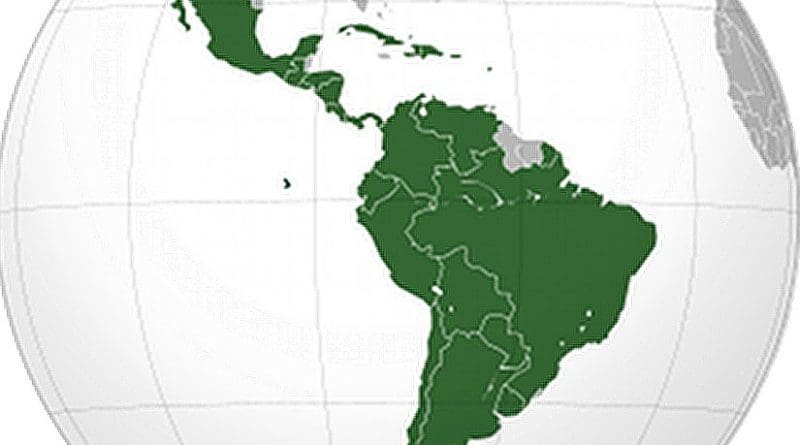Southcom Commander Outlines US’ Latin America Strategy
By DoD News
By Karen Parrish
“Uncertainty, unpredictability, and transregional linkages are the defining characteristics of the world today,” according to Navy Adm. Kurt W. Tidd, commander of U.S. Southern Command, who spoke at the Atlantic Council about Southcom’s strategy for Latin America.
Southcom’s strategic approach to Latin America and the Caribbean, he said, is “not taking place in isolation.”
Tidd said that as Defense Secretary Ash Carter and Chairman of the Joint Chiefs of Staff Marine Corps Gen. Joe Dunford have noted, “We’re in the middle of a strategic transition that touches every corner of the globe.”
In the Western hemisphere, the admiral said, proximity and shared borders add another dimension to an already complex environment, enabling a number of criminal networks to operate.
“So as we think about Latin America, we have to recognize there’s no longer any such thing as a regional challenge,” he said.
“From the activities of China and Russia, to the illicit flows of drugs, weapons and people, to natural disasters and humanitarian crises, the challenges that we confront in this part of the world have one thing in common: they are transregional. … They affect not just this hemisphere, but the rest of our world,” Tidd said.
The framework for Southcom’s work, the admiral said, “centers around maintaining our competitive advantage in the defense and security sectors, countering transnational threat networks, and rapid response to crises.”
Chinese, Russian, Iranian Influence
The answers to three questions inform Southcom’s strategy, he said: “The first being, how should we view the activities of China, Russia, Iran and the Western hemisphere?”
There tend to be two views on that question, Tidd said. “Some say that these so-called external actors don’t pose a significant challenge to U.S. interests in Latin America, at least in the near term. Others worry that we’re ceding ground in a global game of influence and leadership.”
The admiral said he believes that what happens in Latin America or the Caribbean can’t be divorced from what’s happening in the rest of the world. Chinese, Russian and Iranian activities in Southcom’s region are matters for concern, he said.
“Any nation seeking to build regional relationships should respect the inter-American principles of peace, the rule of law, and transparency,” he said. “… The truth is nations like China, Russia and Iran have a mixed track record, at best, on some of these issues.”
Building Partner Capacity
Those nations’ activities deserve Southcom’s scrutiny, Tidd said, but the command’s focus is on building partner relationships. The admiral said he has allowed partner-nation liaison officers to attend a formerly closed intelligence and operations briefing to help develop “knowledge that builds trust; knowledge that expands our friendly networks; knowledge that when applied in a cohesive manner will make us all more effective in defending our shared home.”
He said Southcom is also seeking ways to expand partner nation’s access to “cutting-edge research, new technologies and experimentation opportunities that will advance our collective efforts to confront complex security challenges.”
The second question, Tidd said, is how to address those challenges.
“In Latin America and the Caribbean, the overarching security challenge is a very big one indeed: The destabilizing operations, corruption influence and global reach of transnational threat networks,” the admiral said.
Countering Criminal Networks
Regional criminal networks funnel cocaine and heroin, weapons, illegally mined gold, and “tens of thousands of women and children” to global markets, he said, as well as transporting known terrorists, recruiting fighters for the Islamic State of Iraq and the Levant, and laundering and transporting “dirty money.”
Regional threat networks offer a highly logistical infrastructure that lead into the United States, Europe and Africa, he said, with enough money to buy off judges, police officers or even entire villages.
“So when we look at these myriad networks, it’s clear we need to look beyond just this section of the world, and we need to look beyond simply stopping drugs,” Tidd said, adding that he has directed Southcom personnel to do everything they can to be better partners to other U.S. government organizations.
Southcom will this week host a cooperation workshop to foster interagency cooperation among military, law enforcement, diplomatic and development agencies, he said.
“We don’t often come together like this,” the admiral said. “We talk a lot about dismantling networks, but we also never talk about building our own.”
Tidd said that later this year he hopes to host a similar workshop with partner nations, for “one very simple reason.”
“We know that none of us, no single department or agency, and no single nation, can do it alone,” he said. “So if we’re serious about combating these networks, it will truly require all hands on deck.”
Preparing for Future Threats
The third and final question that informs Southcom strategy, the admiral said, is “Are we ready for what comes next?”
Inevitably a natural disaster or epidemic lies in wait “just around the corner,” he said. “Are we prepared to play our role as part of our larger national security enterprise?”
Southcom, Tidd said, is “training hard to get to yes” by honing rapid-response capabilities and improving interoperability, in part through building military medical capabilities among partner nations and exercising with those militaries.
“We’re fortunate to work with partners that understand what shared responsibility is all about,” the admiral said, “partners who are eager and willing to contribute to regional and international security.”
The service members and civilians at Southcom are “deeply engaged in a part of the world that is, itself, deeply important to our culture, our security, and our economic prosperity,” Tidd said.

